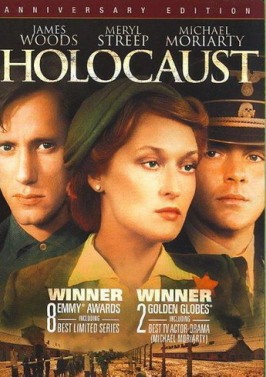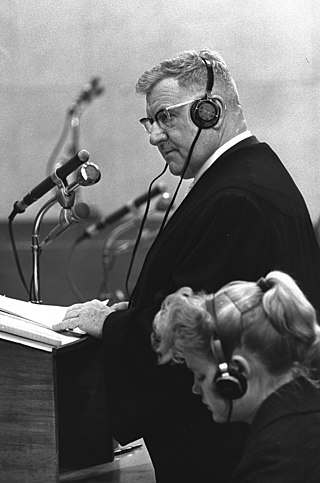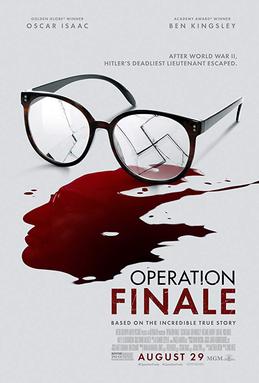
Martin John Christopher Freeman is an English actor. Among other accolades, he has won two Emmy Awards, a BAFTA Award and a Screen Actors Guild Award, and has been nominated for a Golden Globe Award.

Dieter Wisliceny was a member of the Schutzstaffel (SS) and one of the deputies of Adolf Eichmann, helping to organise and coordinate the wide scale deportations of the Jews across Europe during the Holocaust.

Holocaust (1978) is an American television miniseries which aired on NBC over four nights, from April 16 — April 19, 1978.
Laurence Rees is an English historian. He is a BAFTA winning historical documentary filmmaker and a British Book Award winning author of several books about Adolf Hitler, the Nazis and the atrocities committed, especially by them, during the 20th century. He is the former Head of BBC TV History Programmes.

Robert Servatius was a German lawyer, prominent in his profession in Cologne, and especially known for his defense of Nazi war criminals, including Adolf Eichmann.

The following is a bibliography of works devoted to the Nuremberg Trials.

Otto Adolf Eichmann was a German-Austrian official of the Nazi Party, an officer of the Schutzstaffel (SS), and one of the major organisers of the Holocaust. He participated in the January 1942 Wannsee Conference, at which the implementation of the genocidal Final Solution to the Jewish Question was planned. Following this, he was tasked by SS-Obergruppenführer Reinhard Heydrich with facilitating and managing the logistics involved in the mass deportation of millions of Jews to Nazi ghettos and Nazi extermination camps across German-occupied Europe. He was captured and detained by the Allies in 1945, but escaped and eventually settled in Argentina. In May 1960, he was tracked down and abducted by Israel's Mossad intelligence agency, and put on trial before the Supreme Court of Israel. The highly publicised Eichmann trial resulted in his conviction in Jerusalem, following which he was executed by hanging in 1962.

The Eichmann Trial was the 1961 trial in Israel of major Holocaust perpetrator Adolf Eichmann who was captured in Argentina by Israeli agents and brought to Israel to stand trial. The capturing of Eichmann was criticized by the United Nations, calling it a "violation of the sovereignty of a Member State". His trial, which opened on 11 April 1961, was televised and broadcast internationally, intended to educate about the crimes committed against Jews by Nazi Germany, which had been secondary to the Nuremberg trials which addressed other war crimes of the Nazi regime. Prosecutor and Attorney General Gideon Hausner also tried to challenge the portrayal of Jewish functionaries that had emerged in the earlier trials, showing them at worst as victims forced to carry out Nazi decrees while minimizing the "gray zone" of morally questionable behavior. Hausner later wrote that available archival documents "would have sufficed to get Eichmann sentenced ten times over"; nevertheless, he summoned more than 100 witnesses, most of whom had never met the defendant, for didactic purposes. Defense attorney Robert Servatius refused the offers of twelve survivors who agreed to testify for the defense, exposing what they considered immoral behavior by other Jews. Political philosopher Hannah Arendt reported on the trial in her book Eichmann in Jerusalem: A Report on the Banality of Evil. The book had enormous impact in popular culture, but its ideas have become increasingly controversial.

Yehiel De-Nur, also known by his pen name Ka-Tsetnik 135633, born Yehiel Feiner, was a Jewish writer and Holocaust survivor, whose books were inspired by his time as a prisoner in the Auschwitz concentration camp.
Kapo (2000) is an Israeli documentary film about the Jewish kapos who collaborated with the Nazis in concentration camps during World War II. The film was written, directed and produced by Dan Setton, with Tor Ben Mayor and Danny Paran in conjunction with Spiegel TV of Germany and Rai 3 of Italy. It was the first Israeli film to win an International Emmy Award, which it received in the category of Best Documentary.
Events in the year 1962 in Israel.
Events in the year 1960 in Israel.
Leo Hurwitz was an American documentary filmmaker. Among the films he directed were Native Land (1942) and Verdict for Tomorrow (1961), the Peabody Award-winning and Emmy Award-nominated film of the Eichmann trial. He was blacklisted during the McCarthy period for his strong left-wing political beliefs.

The House on Garibaldi Street is a 1979 American television film based on the non-fiction book of the same name, written by Isser Harel. It was directed by Peter Collinson and starred Topol and Martin Balsam. The story is about the Mossad operation that captured Adolf Eichmann in Argentina in 1960 and returned him to Israel for trial.

Kalman Taigman also Teigman Hebrew: קלמן טייגמן was an Israeli citizen who was born and grew up in Warsaw, Poland. One of the former members of the Jewish Sonderkommando who escaped from the Treblinka extermination camp during the prisoner uprising of August 1943, Taigman later testified at the 1961 Eichmann Trial held in Jerusalem.

Night Will Fall is a 2014 documentary film directed by Andre Singer that chronicles the making of the 1945 British government documentary German Concentration Camps Factual Survey. The 1945 documentary, which showed gruesome scenes from newly liberated Nazi concentration camps, languished in British archives for nearly seven decades and was only recently completed.
The Center for Contemporary Jewish Documentation is an independent French organization founded by Isaac Schneersohn in 1943 in the town of Grenoble, France during the Second World War to preserve the evidence of Nazi war crimes for future generations. After the Liberation, the center was moved to Paris in 1944 where it remains today.

Gerard Behar Center is a major arts centre in Jerusalem, Israel, for independent theatre, dance, and musical productions, children's shows, art exhibitions, artist workshops, and festivals. In 2010 the center hosted over 900 events with attendance in excess of 263,600 participants. The center includes two theatres and is home to two dance companies, Kolben and Vertigo.

Operation Finale is a 2018 American historical dramatic thriller film directed by Chris Weitz from a screenplay by Matthew Orton about a 1960 clandestine operation by Israeli commandos to capture former SS officer Adolf Eichmann, and transport him to Jerusalem for trial on charges of crimes against humanity. The film stars Oscar Isaac as the Mossad officer Peter Malkin, and Ben Kingsley as Eichmann, with Lior Raz, Mélanie Laurent, Nick Kroll, and Haley Lu Richardson. Several source materials, including Eichmann in My Hands, by Peter Malkin and Harry Stein, provided the basis for the story.
The Nazis and Nazi Collaborators (Punishment) Law is a 1950 Israeli law passed by the First Knesset that provides a legal framework for the prosecution of crimes against Jews and other persecuted people committed in Nazi Germany, German-occupied Europe, or territory under the control of another Axis power between 1933 and 1945. The law's primary target was Jewish Holocaust survivors alleged to have collaborated with the Nazis, in particular prisoner functionaries ("kapos") and the Jewish Ghetto Police. It was motivated by the anger of survivors against perceived collaborators and a desire to "purify" the community.













